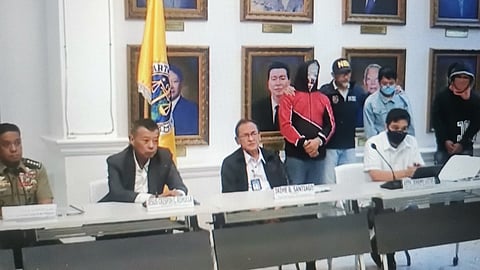
- NEWS
- the EDIT
- COMMENTARY
- BUSINESS
- LIFE
- SHOW
- ACTION
- GLOBAL GOALS
- SNAPS
- DYARYO TIRADA
- MORE

The Armed Forces of the Philippines (AFP) is investigating the involvement of the Chinese government in espionage activities in the country following the arrest of a Chinese national and two Filipino “cohorts” suspected of being spies.
This was confirmed by General Romeo Brawner Jr., AFP Chief of Staff, in a press conference at the Department of Justice on Monday, shortly after authorities presented the alleged Chinese sleeper cell.
Last month, authorities retrieved a Chinese submarine drone in the waters off San Pascual, Masbate.
Brawner, however, said the military was looking into a possible connection between the spy drone and the Chinese sleeper cell.
“We’re looking into the overall espionage effort of China. We believe the drone was made in China, but the specific data it obtained is still being analyzed through forensics,” he explained.
When asked if sleeper cells were targeting military sites, Brawner replied, “Yes, that is very possible.”
He also disclosed that the Chinese spies visited various Enhanced Defense Cooperation Agreement (EDCA) sites.
“When we looked at the areas where this group went, we saw that they entered some EDCA sites. It’s very possible the coordinates and topography could be used for military targeting purposes,” Brawner said.
The Chinese spy was arrested while inside a vehicle driven by one of the two Filipinos.
According to National Bureau of Investigation (NBI) Cybercrime Division chief Jeremy Lotoc, the arrested Chinese national was a specialist in “control engineering.”
Citing open-source intelligence with assistance from the AFP, Lotoc said the Chinese spy was a graduate of a university operated by the People’s Liberation Army (PLA) of China.
“They even had a map showing where to go. In fact, their plan was after covering the entire Luzon, their next targets would be the Visayas and Mindanao,” Lotoc said.
He added that the Chinese national had been in the Philippines for “more or less five years” and had operated discreetly.
“We call him a sleeper [cell] because, throughout our monitoring, he acted normally and blended with different groups. He didn’t draw attention,” he said.
NBI Director Jaime Santiago believed the information gathered by the spy may have already been transmitted to China.
“They are using equipment with real-time kinematics and global navigation satellite systems. It’s possible the information was transmitted in real-time — immediately after being collected,” Santiago said.
Lotoc confirmed that upon examining the Information and Communication Technology (ICT) equipment retrieved from the spy, they found an application capable of remotely accessing the devices over the internet.
“We found a profile name written in Chinese characters actively siphoning data from the ICT equipment. We believe the user was collecting data remotely in real-time while accessing different sites,” Lotoc said.
Meanwhile, Brawner said that Chinese espionage efforts may have started as early as last year, when authorities retrieved a high-tech, military-grade device from a Chinese national identified as Yuhang Liu, who was arrested for brandishing a gun in Makati City.
The suspect had claimed to be a Philippine Offshore Gaming Operator (POGO) employee.
The arrest stemmed from a complainant who reported that Liu coerced them into delivering unidentified communication hacking devices to Liu’s residence.
Defense Secretary Gilberto Teodoro Jr. has previously stressed the need to amend the country’s espionage laws to make them stricter, enabling the government to enforce penalties for espionage activities even during “times of peace.”
